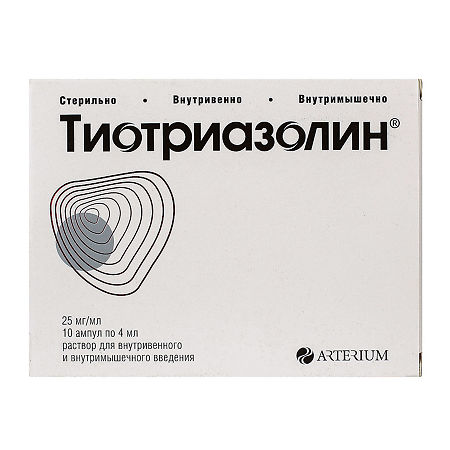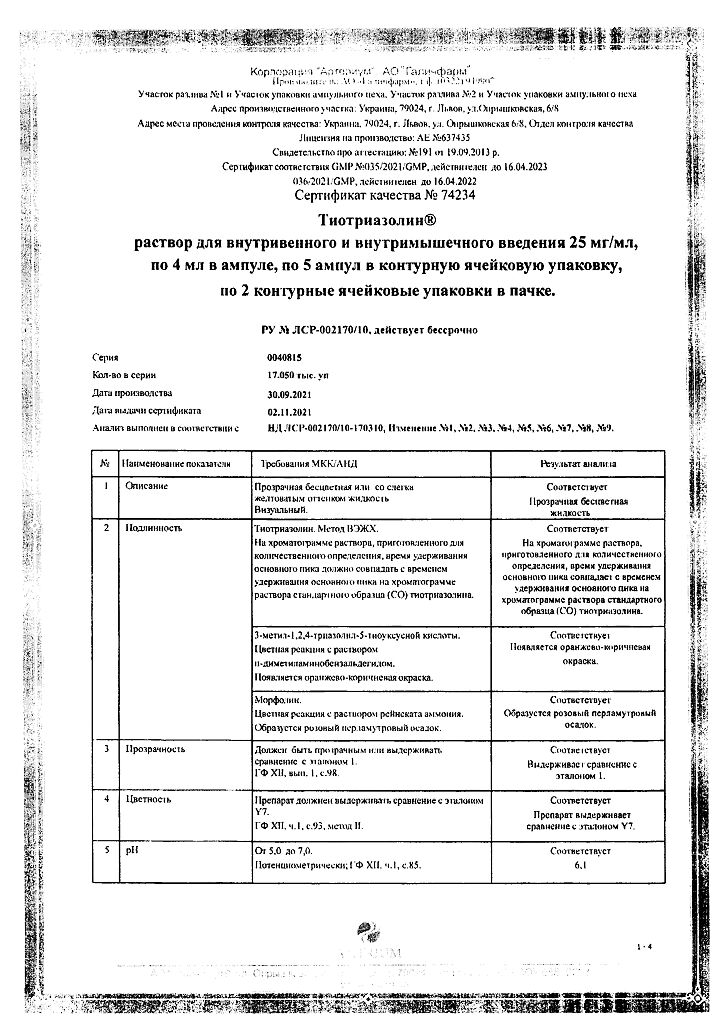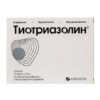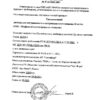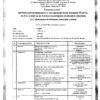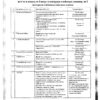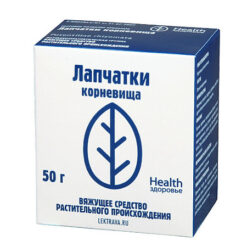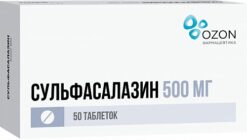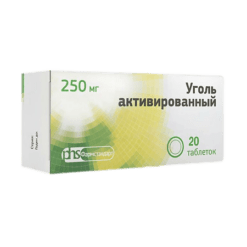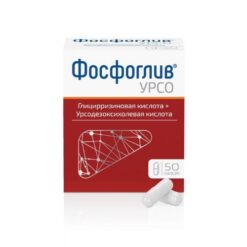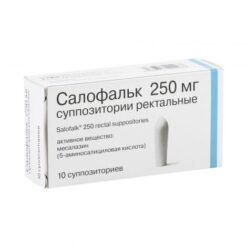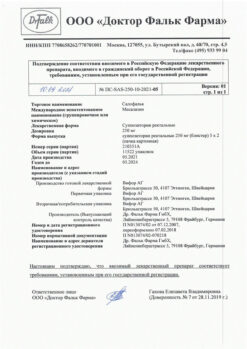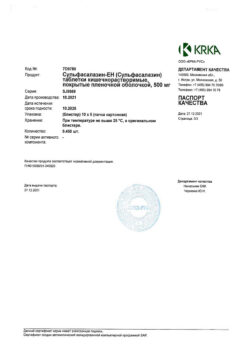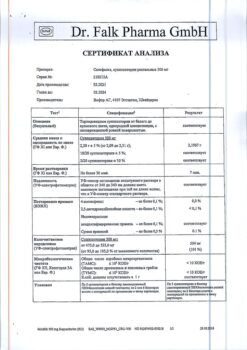No products in the cart.
Thiotriazolin, 25 mg/ml 4 ml 10 pcs
€41.70 €36.14
Out of stock
(E-mail when Stock is available)
Description
Thiotriazolinum is a drug with marked membrane stabilizing, antioxidant, reparative and immunomodulatory activity. Thiotriazolin also has some anti-ischemic action.
The mechanism of action of thiotriazolinum is related to the ability of the drug to enhance the compensatory activation of anaerobic glycolysis as well as to activate the oxidation processes in the Krebs cycle without changing the intracellular ATP fund.
Tiotriazolin activates the antioxidant system due to the sulfur thiol and tertiary nitrogen included in the molecule, which leads to the reduction of the negative impact of free radicals and the intensity of peroxidation processes and the formation of free oxygen ions.
Tiotriazolin reduces myocardial sensitivity to catecholamines, prevents the progressive inhibition of myocardial contractile function and also helps to reduce the zone of ischemia and myocardial necrosis.
Tiotriazolin also normalizes metabolic processes in myocardium, promotes normalization of heart rate and improves rheological properties of blood due to activation of fibrinolytic system.
Tiotriazolin has strong hepatoprotective activity, prevents the destruction of hepatocytes and stimulates their regeneration, reduces the spread of necrosis and fatty liver infiltration.
Thiotriazolin normalizes protein, pigment, carbohydrate and lipid metabolism in hepatocytes. It has some choleretic effect and normalizes the composition of bile.
In oral administration tiotriazolin is well absorbed, bioavailability reaches 53%. With single oral administration, the peak plasma concentration of tiotriazolin reaches within 1.6 hours, with intramuscular administration – 0.84 hours, intravenous administration – 0.1 hour.
The elimination half-life is about 8 hours. Tiotriazolin accumulates in the kidney tissues and to a small extent in the tissues of the lungs, colon, heart and spleen.
Indications
Indications
Chronic alcoholic hepatitis of minimal and moderate activity.
Chronic viral hepatitis, fatty liver, liver cirrhosis.
Toxic liver damage, incl. alcoholic, viral and medicinal origin (antibiotics, antitumor, antituberculosis, antiviral drugs, tricyclic antidepressants, oral contraceptives, etc.).
Pharmacological effect
Pharmacological effect
Thiotriazolin is a drug with pronounced membrane-stabilizing, antioxidant, reparative and immunomodulatory activity. Thiotriazoline also has some anti-ischemic effects.
The mechanism of action of thiotriazoline is associated with the drug’s ability to enhance compensatory activation of anaerobic glycolysis, as well as activate oxidation processes in the Krebs cycle without changing the intracellular ATP pool.
Due to the sulfur and tertiary nitrogen contained in the thiol molecule, thiotriazoline activates the antioxidant system, which leads to a reduction in the negative impact of free radicals, as well as the intensity of peroxidation processes and the formation of free oxygen ions.
Thiotriazolin reduces the sensitivity of the myocardium to catecholamines, prevents progressive inhibition of myocardial contractile function, and also helps to reduce the area of ischemia and necrosis of the myocardium.
In addition, thiotriazoline normalizes metabolic processes in the myocardium, helps normalize heart rate and improves the rheological properties of blood by activating the fibrinolytic system.
Thiotriazolin has pronounced hepatoprotective activity, prevents the destruction of hepatocytes and stimulates their regeneration, helps reduce the spread of necrosis and fatty infiltration of the liver.
Thiotriazolin normalizes protein, pigment, carbohydrate and lipid metabolism in hepatocytes. It has some choleretic effect and normalizes the composition of bile.
When administered orally, thiotriazoline is well absorbed, bioavailability reaches 53%. With a single oral administration, the peak plasma concentration of thiotriazoline is achieved within 1.6 hours, with intramuscular administration – 0.84 hours, intravenous administration – 0.1 hours.
The half-life is about 8 hours. Thiotriazoline accumulates in the tissues of the kidneys and to a small extent in the tissues of the lungs, colon, heart and spleen.
Special instructions
Special instructions
None.
Active ingredient
Active ingredient
Morpholinium Methyl Triazolyl Thioacetate
Composition
Composition
1 ml of solution for injection contains:
active ingredient:
morpholinium methyl triazolyl thioacetate (thiotriazoline) 25 mg.
excipients:
water for injections
Pregnancy
Pregnancy
Contraindicated during pregnancy and breastfeeding.
Contraindications
Contraindications
Hypersensitivity to the components of the drug Thiotriazolin;
childhood;
renal failure;
period of pregnancy and lactation.
Side Effects
Side Effects
Thiotriazoline is generally well tolerated. During the clinical use of Thiotriazolin, isolated cases of adverse reactions were observed:
From the gastrointestinal tract: nausea, dry mouth, bloating;
From the central and peripheral nervous system: general weakness, dizziness, tinnitus;
From the cardiovascular system: tachycardia, increased blood pressure, pain in the heart, arrhythmias;
From the respiratory system: very rarely – shortness of breath, attacks of suffocation.
Allergic reactions: hypersensitivity reactions, fever, very rarely – Quincke’s edema.
From the skin: itching, skin hyperemia, urticaria.
Interaction
Interaction
Thiotriazolin, as a cardioprotective drug, can be used in combination with basic drugs for the treatment of coronary heart disease.
As a hepatoprotective agent, it can be combined with the prescription of traditional methods of treating hepatitis of the corresponding etiology.
Overdose
Overdose
Cases of overdose are unknown.
Storage conditions
Storage conditions
In a place protected from light, at a temperature of 15–25 °C
Shelf life
Shelf life
3 years
Manufacturer
Manufacturer
Ozon, Russia
Additional information
| Shelf life | 3 years |
|---|---|
| Conditions of storage | In a light-protected place at 15-25 °C |
| Manufacturer | Galichpharm, Ukraine |
| Medication form | solution |
| Brand | Galichpharm |
Related products
Buy Thiotriazolin, 25 mg/ml 4 ml 10 pcs with delivery to USA, UK, Europe and over 120 other countries.

